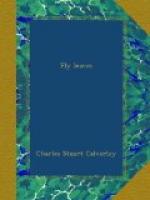From the sweetest of lips in the softest of keys,
And other remarks, which to me are Chinese.
And fast the time flees; till a ladylike sneeze,
Or a portly papa’s more elaborate wheeze,
Makes Miss Tabitha seize on her brown muffatees,
And announce as a fact that it’s going to freeze,
And that young people ought to attend to their Ps
And their Qs, and not court every form of disease:
Then Tommy eats up the three last ratafias,
And pretty Louise wraps her robe de cerise
Round a bosom as tender as Widow Machree’s,
And (in spite of the pleas of her lorn vis-a-vis)
Goes to wrap up her uncle—a patient of Skey’s,
Who is prone to catch chills, like all old Bengalese:-
But at bedtime I trust he’ll remember to grease
The bridge of his nose, and preserve his rupees
From the premature clutch of his fond legatees;
Or at least have no fees to pay any M. D.s
For the cold his niece caught, sitting under the Trees.
MOTHERHOOD.
She laid it where the sunbeams fall
Unscann’d upon the broken wall.
Without a tear, without a groan,
She laid it near a mighty stone,
Which some rude swain had haply cast
Thither in sport, long ages past,
And Time with mosses had o’erlaid,
And fenced with many a tall grassblade,
And all about bid roses bloom
And violets shed their soft perfume.
There, in its cool and quiet bed,
She set her burden down and fled:
Nor flung, all eager to escape,
One glance upon the perfect shape
That lay, still warm and fresh and fair,
But motionless and soundless there.
No human eye had mark’d her pass
Across the linden-shadow’d grass
Ere yet the minster clock chimed seven:
Only the innocent birds of heaven —
The magpie, and the rook whose nest
Swings as the elmtree waves his crest —
And the lithe cricket, and the hoar
And huge-limb’d hound that guards the door,
Look’d on when, as a summer wind
That, passing, leaves no trace behind,
All unapparell’d, barefoot all,
She ran to that old ruin’d wall,
To leave upon the chill dank earth
(For ah! she never knew its worth)
’Mid hemlock rank, and fern, and ling,
And dews of night, that precious thing!
And there it might have lain forlorn
From morn till eve, from eve to morn:
But that, by some wild impulse led,
The mother, ere she turn’d and fled,
One moment stood erect and high;
Then pour’d into the silent sky
A cry so jubilant, so strange,
That Alice—as she strove to range
Her rebel ringlets at her glass —
Sprang up and gazed across the grass;
Shook back those curls so fair to see,
Clapp’d her soft hands in childish glee;
And shriek’d—her sweet face all aglow,
Her very limbs with rapture shaking
—
“My hen has laid an egg, I know;
“And only hear the noise she’s
making!”




